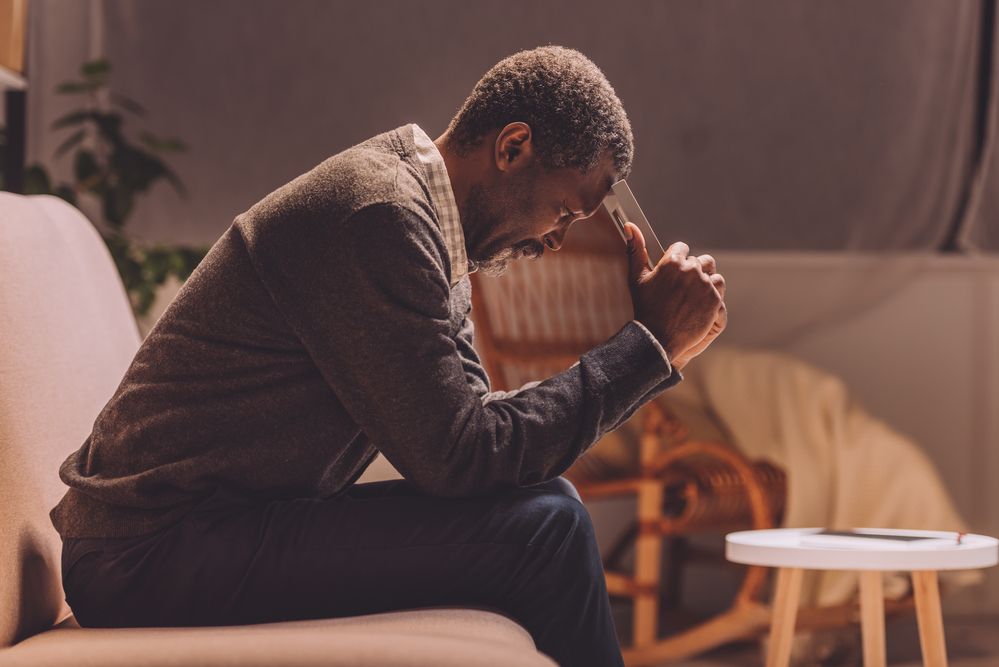March 28, 2020
Coping Skills for Managing Stress & Anxiety in Uncertain Times
Written by Rachel Eddins
Posted in Anxiety, Emotional & Mental Health and with tags: Anxiety, depression, grief and loss, self care

In uncertain times, it is normal for anxiety, worry, panic, stress and depression to peak. Uncertainty and loss of control creates anxiety for everyone.
The whole world is coping with anxiety and the uncertainty of the coronavirus pandemic. If you have specific vulnerabilities such as health or financial challenges, stress and anxiety can be even greater.
Identifying and utilizing your coping skills for anxiety, stress, and worry can help you protect both your mental health as well as your physical health.
How Does Stress Impact Your Physical Health?
Perhaps you feel restless, maybe you can’t sleep, or find it impossible to turn off your mind, no matter how tired you feel.
Or maybe you have been alternating between feeling “tired but wired”, then lacking any energy or motivation at all? You might find it difficult to focus or concentrate or difficult to relax.
Physically, stress can:
- increase your blood sugar
- increase your blood pressure
- interfere with your fertility
- weaken your immune system
- create heartburn due to increase in stomach acid
- lead to tension headaches
- lead to depression
- throw off your menstrual cycle
So what can you do to cope with anxiety and stress in uncertain times?
Physical and emotional symptoms of stress are a normal reaction to stress and uncertainty. Our emotions come in unexpected waves and sometimes make no sense at all.
Whether you are feeling overwhelmed by global events or something stressful and uncertain in your personal life, coping skills for anxiety are the same and will benefit you in future stressful situations.
Here are some strategies to increase your coping skills for anxiety and resilience to manage the stress and worry that comes from uncertainty.
Coping with Anxiety, Stress & Uncertainty
The first step is to simply be aware that you are experiencing symptoms of anxiety, stress or worry. Anxiety and stress impact both our body and mind.
Common symptoms of anxiety include:
- muscle tension
- insomnia
- elevated heart rate
- racing thoughts
- excessive worry
- rapid heart rate
- sweating
- nausea
- irritability
- difficulty breathing
- chest pains/heart palpitations
- “worse-case scenario” thoughts
- difficulty concentrating
Anxiety & Worry are Normal Responses to Stress
It’s normal to experience worry and anxiety when things are uncertain or out of our control.
Anxiety is positive in that it prepares us to take action. Trying to stop worrying might not be the best answer since worrying can help us solve the problem.
However, we need to worry strategically.
Ask yourself, “what aspect of this situation do I need to consider?” “What risks do I need to be mindful of and how can I minimize those?” “What is within my control?”
When your mind doesn’t stop once you answer those questions, your anxiety may no longer be helpful.
Building Coping Skills for Anxiety, Stress, Worry & Uncertainty
Try these strategies to cope with anxiety:
- Take it one day at a time
- Build your resilience muscle
- Check in with your needs / allow your feelings
- Acknowledge your grief / powerlessness
- Pay attention to your body & relieve physical tension
Coping Skill #1: Take it One Day at a Time
Take it day by day. one moment at a time. Focus on what you do know for sure. What can you count on?
Structure, family, friends, pets, support.
Get a sense of control back by scheduling your time well. Create structure and write down what you are going to do everyday. Find your new normal. Put yourself first and create a routine that works for you and your family.
Try and stick to your usual schedule and create boundaries between work time and family time. When you have it written down it doesn’t bog you down. You also get to decide when you are going to do things, which gives you more control.
Choose your news sources wisely and limit the time you will spend on it. Decide on one or two authoritative sources (hint, social media is not an authoritative source). Accurate information reduces anxiety.
Too much information (and inaccurate information) increases anxiety. Decide on one time of day that you will “catch up” on news and limit it to that. Fill the rest of your day with your new routine.
Don’t make any major decisions unless you absolutely have to.
Coping Skill #2: Focus on Building Your Resilience Muscle
I am writing this article from Houston, TX where we were hit, three years in a row, by devastating floods and just a few years earlier by Hurricane Ike and before that, Hurricane Rita. Those disasters resulted in massive losses and brought on strong emotions and feelings of fear and uncertainty for many people.
What those experiences taught me is that despite devastation, loss and trauma, people are resilient. We can and will survive this pandemic. Together.
The future may look different than we anticipated, but we will survive and adapt to the new reality over time, thanks to resilience.
This mindset coping strategy can be applied to any difficult situation you are facing.
Consider difficulties you have experienced in your life, even when you were younger.
How did you cope? How did you get through it? What coping skills for anxiety, stress or difficulties did you use? Are there people or resources you relied on (even if they were unhealthy coping mechanisms, you still got through it).
What coping skills for anxiety or worry worked for you?
You may have used coping strategies you forgot about. Or perhaps you didn’t recognize the skills you used. Consider coping skills you used as a child. Maybe you listened to music, or rode your bike. Those coping strategies may work for you today as well!
What else can you do to increase your resilience muscle?
1. Prioritize Connections with Others.
Reach out to those you know, like and love through facetime, text, phone calls, video calls. etc. Lean on your community. Chances are someone else is experiencing what you are. Sometimes they have more to give and sometimes you have more to give. We’re in this together and need each other’s support.
You never know where that next bit of helpful support comes from so broaden your reach. It might be a friend or family member who gets you, but it could also be a distant, remote colleague who is going through the same thing that you are. Or your old high school friend you reconnected with on social media.
Everyone copes in their own way, but remember that everyone is still coping just like you are. Even if, on the outside, it appears they are “doing fine.” When we don’t share our truth with others, it’s easier to feel that we are all alone. When we’re open and honest, we’re more likely to get what we need.
2. Be Flexible & Realistic with Self-Care
We all have preconceived notions of what “good self-care” looks like. Meditation, yoga sessions, exercise, turning off the screen time, eating healthy, etc.
These are the “shoulds” of self-care and honestly, shoulds aren’t realistic in a moment of stress. And even less so when your world has been turned upside down. The most important thing you can do is stick to regular daily self-care routines such as consistent meal times, breaks, and work vs off time. Don’t forget water! Keep a glass with you throughout the day.
When considering what self-care looks like for you, practice checking in with what you need right now. What feels doable in the moment? What does your here and now body need?
Perhaps what you need most right now is to take action on something you can control (i.e., stocking up on supplies). On the other hand, maybe it’s doing nothing, sitting still and taking a nap.
Or maybe it’s comfort baking, going outside, playing games with others, or just stretching and taking a deep breath. Perhaps it’s ensuring that you are eating consistently vs. worrying about whether your meals are healthy.
You are coping with some heavy stuff right now. It’s ok to procrastinate, be unproductive, not know what to do and feel out of sorts. Give yourself permission to be where you are in this moment.
Remember, it’s ok to rest and it’s ok to do nothing.
Here are some ideas on how you can calm and comfort yourself if you’re feeling stuck.
3. Manage your mindset.
One of the most important coping skills for anxiety is managing your mindset and watching out for negative thinking. While considering negative thoughts and outcomes is an important part of problem solving, getting stuck there can increase anxiety and stress.
When we experience fear or uncertainty, it’s normal for our minds to go well into the future and for some of us, that means, “worse case scenario.” On the other hand, we can avoid the present reality, which can get us into trouble as well.
It can be challenging to find the right balance between planning and preparing and getting stuck in anxiety and fear of the future.
Coping with anxiety thoughts and worries involve checking in and asking yourself the following:
What is your current perspective? What is helpful for you to hear right now?
Can you identify some things in the current moment you are grateful for?
What is right in your life at this present moment?
Is there one thing you can focus on today that would help you move towards your goals?
Remember that we grow when faced with a challenge. There will be positive changes in our broader system that come from this event, just as there have been in the past.
Never before in the history of the world, have we been focusing on the same problem, together. The most brilliant people on this planet are working on it. We will figure it out.
Try this mantra: “I choose to focus on what I can control.”
Coping Skill #3: Do a Feelings & Needs Check In
You may also feel pressure to put on your “brave face”. While I’m certainly not downplaying the value of thinking positively, sometimes we just need to feel what we feel while being mindful of not getting “stuck” in those feelings.
The best way to do that is to acknowledge them, and then identify what it is we actually need in that moment.
Do a body scan and ask yourself:
“What am I feeling right now?”
You don’t need to identify a specific feeling in particular, just anything you are aware of in your body. It could be an urge to cry, which you might experience as tension behind your eyes. It might be a tight sensation in your stomach, throat, chest or shoulders. Or perhaps it’s an overall feeling of fatigue and exhaustion.
You can use this chart to identify a specific feeling (or feelings).
It doesn’t matter if you have the words or not, it’s simply about noticing what is happening right now in your body.
Once you have a general idea, ask yourself:
“What do I need right now?”
Meeting our needs helps us to move through the feeling.
Addressing your needs can also be the primary way you develop coping skills for anxiety and stress. Once you identify what you need, this can tell you which coping skills to focus on directly.
Your need can be an action that you need to take such as increasing play or connection, expressing creativity, reaching out for support, setting a boundary, moving your body, or acknowledging what you feel with compassion.
Here are some examples of needs. Review this list to see which areas resonate with you and where you can take action that would be support you.
Radical Acceptance
In situations in which we have no control, radical acceptance can be what we need to get unstuck.
How would your behavior change if you practiced radical acceptance? What would be different?
Most likely, you would find a way to move forward. Remind yourself it is what it is, you have the skills to cope and you are not alone. You will get through this.
If you are feeling very overwhelmed or anxious, grounding techniques and self soothing skills can help bring you back to the present moment, where you are safe.
Coping Skill #4: Acknowledge Grief
As we experience the impact of the global pandemic, we will experience grief in some form. There is grief in the loss of the feeling of safety and protection and everything that was the normal of our lives.
Perhaps there is grief for others who are impacted, for the losses of celebrations, and events, or even the loss of the semester at school. There is also grief in the loss of connection as we practice social distancing.
The first step to coping with difficult emotions such as sadness, disappointment and grief is to name them.
The anxiety of your mind going to worse case future scenarios is the anticipatory grief of uncertainty.
The numbness you feel is the shock of grief.
The fatigue and exhaustion you feel is the collapse of grief.
Grief comes in waves and covers a range of emotions.
Bring some compassion to yourself for what you are feeling. Again, if it feels overwhelming, use grounding skills to bring you back to the present moment where you are safe.
A basic grounding technique you can use is the 5-4-3-2-1 method.
Using your 5 senses, notice 5 things you hear, 4 things you see, 3 things you can touch from where you are right now, 2 things you can smell and 1 thing you can taste.
Coping Skill #5: Focus on Your Breath
Coping with anxiety starts with the breath. Slowing down your breathing and focusing on deep breathing is one of the most effective relaxation techniques.
If you’re feeling out of control, experiencing tightness in your chest, stomach pain, etc., start with your breath. Your breath is the fastest way to calm and soothe your body. Slow down your breathing and focus on belly breathing – imagine your belly rising and falling with each breath. You can put your hand on your belly to focus on this sensation while taking in a few deep breaths.
Practice breathing exercises:
Breathe in deeply (3-5 counts), hold for a few counts longer, and then focus on exhaling longer than your inhale. (5-8 counts). Allow all of your breath to exhale before taking in the next inhale. Exhaling activates your body’s relaxation response and can help slow down intense emotions.
Coping Skill #6: Move Your Body
When you are stressed, anxious or overwhelmed, it’s normal for your muscles to feel tight and tense. The energy from your emotions is stuck in your body and needs to be released.
Try stretching and moving your arms above your head. Opening the heart is also associated with feelings of joy so you can practice raising your arms up and out above your head to stretch while opening your chest, Yoga movements can be especially helpful.
Release built up energy through intense bursts of movement. Do several jumping jacks for example and pay attention to how your body feels as it jumps in the air or touches the floor,
Get outside and go for a walk or toss a frisbee with your dog. Pay attention to your experience through your five senses. This can ground you into the present moment, which can help you feel calm again.
You might consider adding a regular movement routine during your usual commute time.
Coping Skill #7: Try Progressive Muscle Relaxation
Progressive muscle relaxation can also help you relieve tension in your muscles and bring your body back into a calmer state. The basic steps are listed below. Here is a link to guided instructions if you prefer to listen to someone’s voice.
- Tense and relax each muscle group, head to toes (or toes to head), one muscle group at a time.
- Tense (5 seconds), then let go; relax the muscle all the way. Notice the tension; notice the difference when relaxed.
- As you relax each muscle, say to yourself, “Relax.”
Seek Help From a Therapist
How do I know if I need to seek help? Is your anxiety interfering with the normal things you would be doing? Are you feeling panicky or is it interfering with your ability to sleep, do work, or your daily routines? If so, it is probably time to reach out to a therapist.
A therapist can help you learn and build coping skills for anxiety and stress while providing support and practical resources for what you are going through.
Therapists are available through telehealth – over the phone or online video – so help is available.
5 Ways to Reduce Anxiety
Get instant access to your free ebook.
Grounding & Self Soothing
Get instant access to your free ebook.
Create Healthier Thoughts & Feelings
Get instant access to your free ebook.
Why You Feel This Way
Get instant access to your free ebook.



















